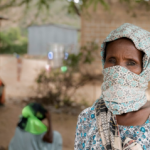The COVID-19 pandemic is undermining food and nutrition security on a global scale. IFPRI estimates show that globally the pandemic could push 80-140 million people into extreme poverty in 2020, more than half in Africa south of the Sahara. The World Food Programme estimates that globally, the pandemic is projected to double the number of people facing acute food insecurity by the end of 2020. These impacts—stemming from lost incomes due to lockdowns, fear of exposure, and medical expenses, as well as disruptions in food markets and value chains—are severely testing social protection systems in many countries. How effective are those systems in blunting these effects?
Ethiopia offers one encouraging test case that may provide lessons for designing more effective policies and interventions. In a recent discussion paper, we outline evidence on the role of Ethiopia’s flagship social protection program, the Productive Safety Net Program (PSNP) in protecting household food insecurity in rural areas during the pandemic—finding that the program offset virtually all adverse pandemic-related impacts for participating households. These results demonstrate the value of having social protection programs in place prior to the onset of shocks in order to protect the food security of poor households. Read more.
